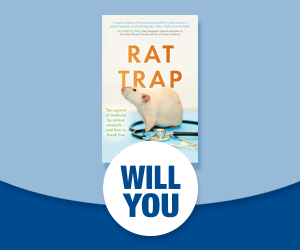 A report by the Oxford Centre for Animal Ethics, supported by more than 150 leading academics and intellectuals, including Nobel Laureate J. M. Coetzee, concludes that animal experimentation is “one of the major moral issues of our time”. Safer Medicines would add that it is also a major moral issue for patients and all of us affected by biomedical research; i.e. all of us.
A report by the Oxford Centre for Animal Ethics, supported by more than 150 leading academics and intellectuals, including Nobel Laureate J. M. Coetzee, concludes that animal experimentation is “one of the major moral issues of our time”. Safer Medicines would add that it is also a major moral issue for patients and all of us affected by biomedical research; i.e. all of us.
It is worth examining what the various political parties have pledged with respect to this issue in their 2015 election manifestos.
The Conservatives say they will: “work to accelerate the global development and take-up of alternatives to animal testing where appropriate.”
Labour does not mention the issue at all in their manifesto.
The Liberal Democrats say they will: “minimise the use of animals in scientific experimentation, including by funding research into alternatives. We remain committed to the three Rs of humane animal research: Replace, Reduce, Refine.”
The Green Party make clear commitments towards ending all animal experimentation, saying they would take immediate action to: “Introduce a comprehensive system for reviewing animal experiments and initiate a comparison of currently required animal tests with a set of human-biology based tests.”
UKIP say they will: “Challenge companies using animals for testing drugs or other medical treatments on the necessity for this form of testing, as opposed to the use of alternative technology.”
Of course, actually delivering on these pledges is another matter. The current coalition Government pledged in 2010 to “work to reduce the use of animals in scientific research”. Yet the number of animal experiments is now at its highest level since the current recording system began. The recently published Delivery Report shows that this Government made little attempt to honour its pledge, preferring instead to focus on efforts to communicate the importance of animal research to the public.
Let us hope that the next government will take the issue as seriously as it deserves.


 We are delighted to welcome Rebecca Ram, MSc as our new Scientific Consultant. Rebecca is also a Scientific Consultant to the Lush Prize team at the Ethical Consumer Research Association. She holds an MSc in Toxicology with Bioinformatics and has worked as a Clinical Data Manager at University College London Hospital, and in pharmaceutical clinical trials for GlaxoSmithKline. She was a Project Manager of cancer clinical trials and whole genome sequencing for Genomics England, as part of the 100,000 Genomes Project. In addition to her role with Safer Medicines Trust, she is also the Communications Officer for the Alliance for Human Relevant Science.
We are delighted to welcome Rebecca Ram, MSc as our new Scientific Consultant. Rebecca is also a Scientific Consultant to the Lush Prize team at the Ethical Consumer Research Association. She holds an MSc in Toxicology with Bioinformatics and has worked as a Clinical Data Manager at University College London Hospital, and in pharmaceutical clinical trials for GlaxoSmithKline. She was a Project Manager of cancer clinical trials and whole genome sequencing for Genomics England, as part of the 100,000 Genomes Project. In addition to her role with Safer Medicines Trust, she is also the Communications Officer for the Alliance for Human Relevant Science.
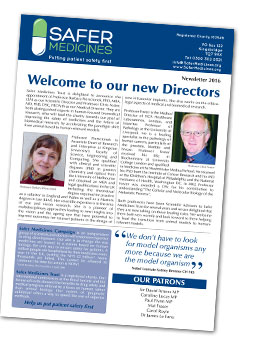 Read our latest newsletter
Read our latest newsletter Professor Pierscionek is Associate Dean of Research and Enterprise at Kingston University’s Faculty of Science, Engineering and Computing. She qualified with clinical and scientific degrees (PhD in protein chemistry and optics) from the University of Melbourne and obtained an MBA and legal qualifications in the UK including the theoretical degree required for practice as a solicitor in England and Wales as well as a Masters degree in Law (LLM). Her scientific expertise is in the area of eye and vision research. She is a pioneer of multidisciplinary approaches leading to new insights into the vision and the ageing eye that have potential to improve outcomes for cataract patients in the design of new intraocular implants. She also works on the ethico-legal aspects of medical and biomedical research.
Professor Pierscionek is Associate Dean of Research and Enterprise at Kingston University’s Faculty of Science, Engineering and Computing. She qualified with clinical and scientific degrees (PhD in protein chemistry and optics) from the University of Melbourne and obtained an MBA and legal qualifications in the UK including the theoretical degree required for practice as a solicitor in England and Wales as well as a Masters degree in Law (LLM). Her scientific expertise is in the area of eye and vision research. She is a pioneer of multidisciplinary approaches leading to new insights into the vision and the ageing eye that have potential to improve outcomes for cataract patients in the design of new intraocular implants. She also works on the ethico-legal aspects of medical and biomedical research.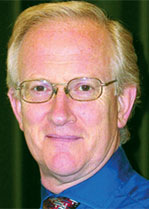 Professor Foster is the Medical Director of HCA Healthcare Laboratories, London, and Emeritus Professor of Pathology at the University of Liverpool. He is a leading specialist in the pathology of human cancers, particularly of the prostate, bladder and breast. Professor Foster received his BSc in Biochemistry at University College London and qualified in Medicine at the Westminster Medical School. He received his PhD from the Institute of Cancer Research and his MD at the Children’s Hospital of Philadelphia and the National Institutes of Health, Washington DC. In 2002, Professor Foster was awarded a DSc for his contribution to understanding “The Cellular and Molecular Biology of the Metastatic Process”.
Professor Foster is the Medical Director of HCA Healthcare Laboratories, London, and Emeritus Professor of Pathology at the University of Liverpool. He is a leading specialist in the pathology of human cancers, particularly of the prostate, bladder and breast. Professor Foster received his BSc in Biochemistry at University College London and qualified in Medicine at the Westminster Medical School. He received his PhD from the Institute of Cancer Research and his MD at the Children’s Hospital of Philadelphia and the National Institutes of Health, Washington DC. In 2002, Professor Foster was awarded a DSc for his contribution to understanding “The Cellular and Molecular Biology of the Metastatic Process”. 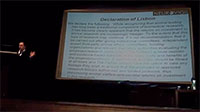

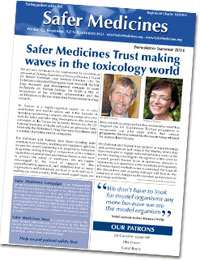

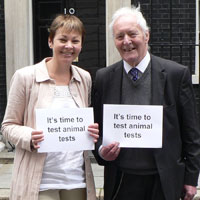


 Dr Bob Coleman gave a
Dr Bob Coleman gave a 